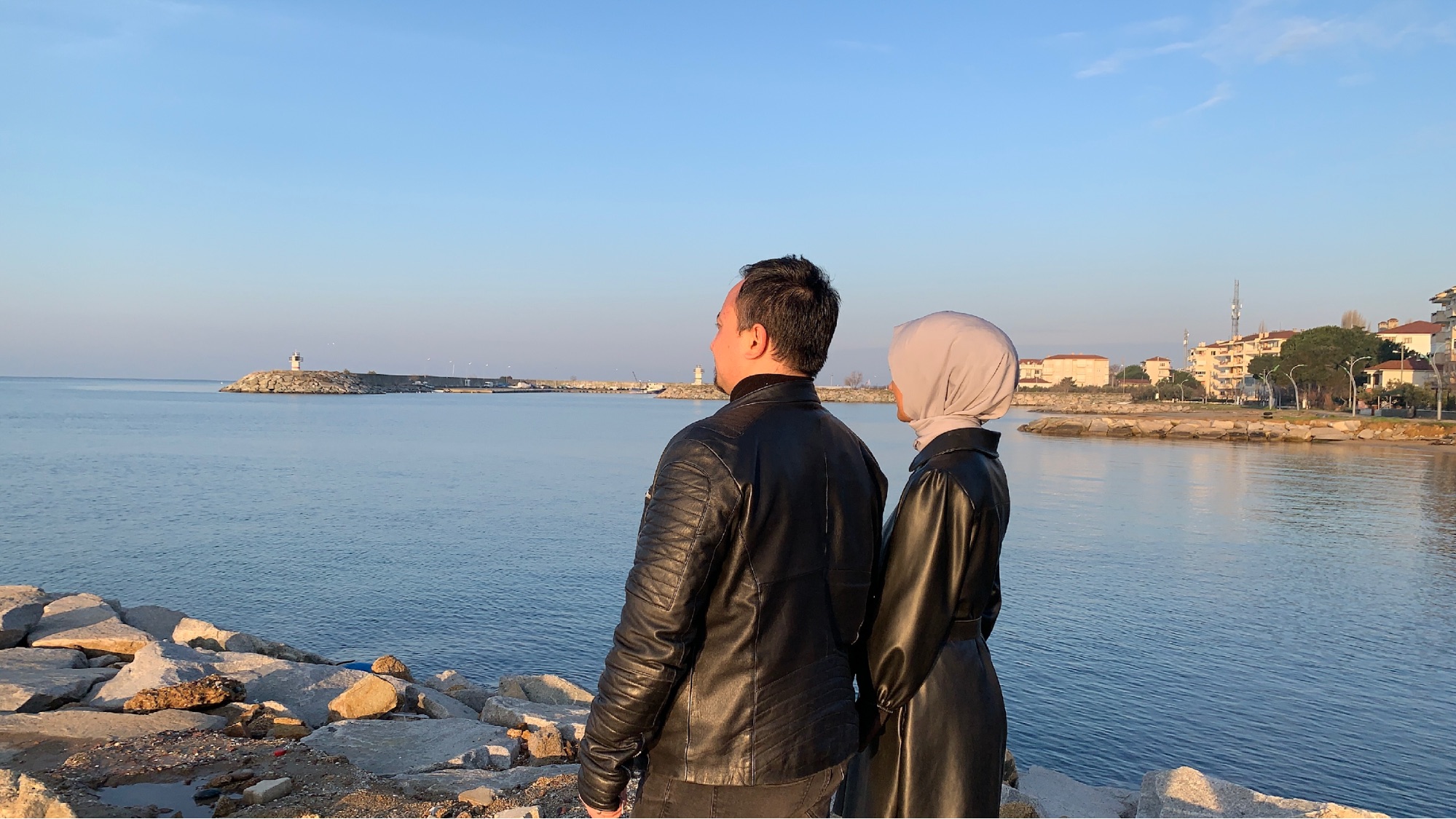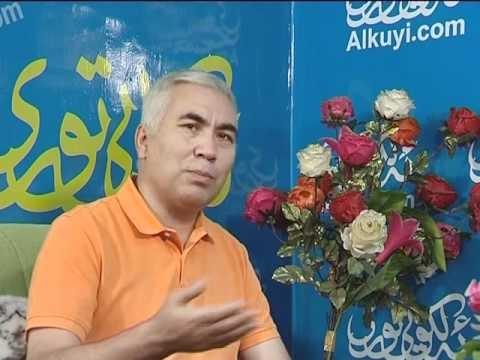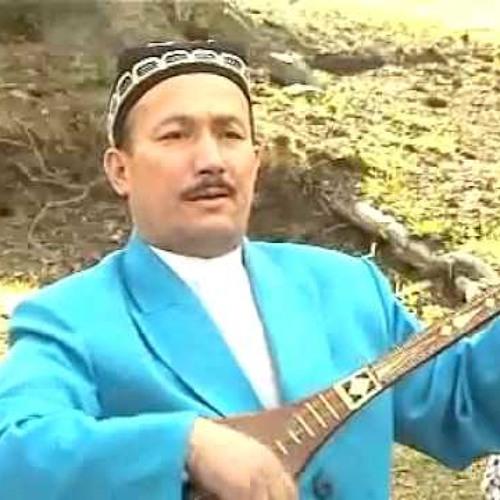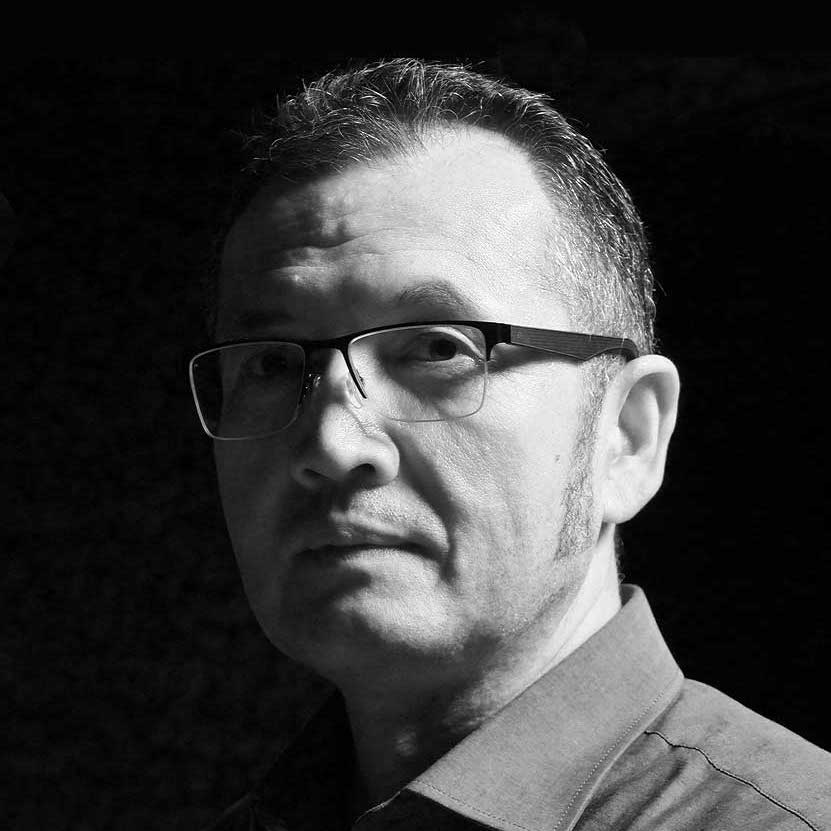Uyghur voices in Istanbul
A Uyghur couple turns to music — inspired by the songs and poems of their culture — in response to the crisis in their homeland.

It was Mother Tongue Evening (Ana til kechisi) at the Nuzugum Family and Cultural Organization for exiled Uyghurs in Istanbul. Over a hundred fully veiled women, and a handful of men, squeezed into a concert venue kindly provided by the Zeytinburnu municipal government. Several hundred children ran up and down the stairs brandishing light blue balloons printed with the crescent moon and stars of the Uyghur flag, while a group of young women teachers possessed of extraordinary calm and determination ushered them on and off the stage to deliver a series of Uyghur-language poems, theatrical skits, and songs.
It was an inspirational event. “The principle struggle of our people,” declared Munawer Özuygur, leader of the Nuzugum organization, “is to preserve our language and culture.” Toward the end of the evening, a group of 10 girls sang, tunelessly but with heartfelt feeling, to a recording of a recently composed song, “No Road Back Home” (Yanarim Yoq).
The song is an affective pop ballad created and performed by a young Uyghur couple who uses the stage names H. Yenilmes (Undefeated) and A. Kilich (Sword). The song is a setting of a poem by university professor and poet Abduqadir Jalalidin, who disappeared into one of Xinjiang’s mass internment camps in 2018, one of the estimated 1.7 million Uyghurs and other Muslims detained without formal charge and subjected to a brutal and coercive regime of “re-education.” Jalalidin’s poem began circulating on Uyghur exile social media networks in 2020. It was said to have been composed by Jalalidin from inside the camp, and memorized by a fellow inmate who shared it with the world after being released.
In this forgotten place I have no lover’s touch \
Each night brings darker dreams, I have no amulet \
My life is all I ask, I have no other thirst \
These silent thoughts torment, I have no way to hope…(Excerpt, translated by Joshua Freeman)
Strong stuff, perhaps, for 10-year-olds. But these exiled children have not been lucky enough to lead sheltered lives. Many have lost their father along the long road from their homeland to Turkey, and their mothers lead precarious lives in Istanbul, often lacking residence rights and work permits. For these children, the song provides a way of making sense of their situation, and an experience of catharsis in the face of ongoing trauma.

Yenilmes and Kilich arrived here in 2016, part of a wave of Uyghur migrants escaping the increasing repression in their homeland, just before the “walls of iron and nets of steel” ordered by Xí Jìnpíng 习近平 went up around the region, communications between Uyghurs inside and outside the region were cut, and escape became almost impossible. Over the past few years, Yenilmes and Kilich have come to the fore of the Uyghur exile community in Turkey, creating a series of songs which aim to express the suffering of their people, and provide them with spiritual solace.
Their music is a surprising blend of flamenco-inspired pop and the deep-rooted Sufi-inflected religious culture of Kashgar. Their personal stories, and the lyrics which they choose to sing, speak to the troubled 20th-century history of the Uyghur people, and the ways that Uyghurs in exile today are responding to the ongoing crisis in their homeland.

We spoke with H. Yenilmes and A. Kilich in March in their apartment in a crumbling seaside resort on the Bosphorus, where they go to escape the pressures of life in Istanbul and focus on their music. This is their story.
From Ürümchi to Istanbul
H. was born into a family of hereditary Sufi devotees from Kashgar who settled in Xinjiang’s capital of Ürümchi in the early 1990s. There, her family somehow maintained a semi-underground but vibrant community religious life up until 2016, when the increasing repression of religious practice impelled them to flee to Istanbul.
“By the time I was five years old I was reciting the Quran and receiving religious education,” she told us. “My father and grandfathers were Sufis, religious people…every day we prayed, we held many religious gatherings, and we studied. My whole life was dedicated to religion.”
H. began memorizing the Quran when she was just five years old. She learned to interpret the meaning of the Quran and to recite its verses. “We found that I had a good ear for melody,” she told us. “I listened to many recordings of the Quran. I started teaching Quranic recitation myself when I was 11 years old, and I’ve been teaching ever since.”
H. is an extraordinarily talented reciter, with flawless Arabic, who can give uncanny imitations of the great Egyptian reciters of the 20th century, and produce her own original and beautifully realized renditions of verses of the Quran. In Istanbul, she makes a living teaching online recitation classes for Uyghur women across the diaspora.
In contrast, A. grew up in the southern town of Khotan. He passed the exam for the prestigious Xinjiang Arts Institute when he was 12, and moved to Ürümchi to study Uyghur traditional dance. But his real passion was for music, and he spent his time teaching himself dutar and guitar and listening endlessly to the latest Uyghur pop releases on cassette. It was a parallel but completely separate life to that of H. growing up in the same city.
The mid-1990s was a time when the Gipsy Kings took Ürümchi by storm, and in 1999, A., aged 14, started his own pop flamenco-style band. He was discovered by the rising Uyghur pop star Erkin Abdulla and went with the band to Beijing, where they became a big hit with young Chinese audiences with their blend of Uyghur and Chinese lyrics, virtuoso guitar riffs, belly dancing, and hot Cuban rhythms.
Erkin Abdulla performing on Chinese TV in 2009
After five years with Erkin, A. abandoned this scene and went back to Ürümchi to start a textile business. He didn’t touch his guitar for another 10 years, when he emigrated to Istanbul, in 2016, and met H.
Meeting because of Abdurehim Heyit’s “The Meeting”
That pop flamenco legacy is still audible in their songs, but it has fused with a very different tradition. Alongside her rigorous training in Quranic recitation, H. also trained with Abdurehim Heyit, the master folk singer and dutar player from Kashgar.
“I met Abdurehim Heyit when I was 15 years old,” H. told us. “I used to go to his home once or twice a month, and he coached me in vocal style. I had a voice before I met him, but after I studied with him I discovered my voice properly. My voice developed real strength. I learned to sing some of his songs, and he said, ‘Many people sing my songs and I never felt they were as good as me, but when you sing, you are the best.’”
This was high praise. Before his detention in 2018, Abdurehim Heyit was one of the most famous singers of traditional-style Uyghur songs, especially known for his performances of the folk songs of his native Kashgar and his own settings of lyrics by well-known poets of the 20th century. He was an iconic figure in contemporary Uyghur culture, instantly recognizable with his leather boots, embroidered hat, and mustache. His songs were not only popular among Uyghurs but were also widely known in Turkey.
This popularity in Turkey sparked a bizarre diplomatic spat between China and Turkey in 2019 after rumors circulated that Heyit had died in the camps. President Recep Tayyip Erdogan was moved to make one of the strongest statements yet from a world leader about the repression of the Uyghurs, and China responded with a “confession” video featuring an aged and tired Abdurehim Heyit claiming that he was in good health and awaiting sentence for undisclosed crimes. While Heyit remains silenced and under house arrest, the legacy of his songs lives on in Turkey.
“I never sang any songs when I was in the homeland, I only recited the Quran. But after I came to Istanbul I decided I wanted to use my voice to the full,” H. recalled. “I started out singing solo, with no accompaniment, but I realized I really needed a musician. I started looking for someone who could play the dutar…but then a girl in one of my Quran classes said, ‘I have a brother who plays Abdurehim Heyit’s songs on the guitar.’
“So I checked out his Instagram. He never showed his face in his videos. You could only see his hands on the guitar. And he was playing one of my favorite songs by Abdurehim Heyit: Uchrashqanda (‘The Meeting’).”
https://youtu.be/72x8lhF6aaY
A. plays the guitar at the 46-second mark in the above video
“The Meeting” is one of Abdurehim Heyit’s most powerful and politically meaningful songs. Its lyrics are from the renowned 20th-century poet Abdurehim Ötkur, written in 1947 to commemorate the 15th anniversary of the failed independent East Turkestan Republic, at a time of deep repression in the Uyghur region under the rule of the Chinese Nationalist governor Shèng Shìcái 盛世才. The lyrics take the form of a dream encounter with a female spirit:
I asked, Is there an iron collar (awaiting us)?
She replied, It’s (already) around our necks.
I asked, Is death awaiting us?
She replied, It’s on the road ahead for us.I asked, (What about) handcuffs?
She replied, They’re already on our wrists.
I asked, Are you terrified?
She replied, No, I’m not!I asked, Why are you so fearless?
She replied, Our God is with us.
I asked, What else?
She replied, Our people are with us.
[…](Excerpt, translated by George Tzamouranis)
H. was impressed but nervous. “He played ‘The Meeting’ amazingly well. I wasn’t sure if I should get in touch or not. I thought, he’s a real professional! Would he want to play with me? What would I do if he said no? I hesitated for months, but in the end I contacted him. I sent him a recording of my voice and asked if he would accompany me.”
At first they met to rehearse on the seafront in Istanbul, accompanied by two chaperones. After a short time the encounter solidified into a musical partnership and a marriage.
Recording history
Their first proper release was another of Abdurehim Heyit’s songs, Aldida (“Before”). The song begins with a solo guitar brilliantly imitating the sound of the traditional Uyghur dutar before shifting into a flamenco-flavored pop beat underpinning H.’s vocals. The musical style tends toward the light pop of A.’s earlier work with Erkin Abdulla, but the lyric meaning is very different. The lyrics are by another important 20th-century poet called Nimshehit.
Nimshehit served under the East Turkestan Islamic Republic, which briefly controlled the Kashgar region in the 1930s. His name, literally “Half a Martyr,” was coined after he was shot in the neck and almost died in battle with the Chinese Muslim forces of Mǎ Zhòngyīng 马仲英.
I will return, my love, never lose your hope \
Keep striking at your enemy and never let them go free \
Don’t be fooled, don’t join the feast with your enemy \
Don’t let the enemy pick fruit from my orchard \
Soon we will find each other in the land of flowers
[…](Excerpt of “Before,” by Nimshehit, translated by Aziz Isa Elkun and Rachel Harris)
Nimshehit survived into the 1960s, but suffered a violent and abject end during the Cultural Revolution at the hands of the Red Guards. Lyrics like the above, even with their explicit message of resistance, could be performed under the People’s Republic because they fell within the parameters of the revolutionary struggle (led by the Chinese Communist Party) against the reactionary Nationalist forces. The way they were heard by Uyghurs, of course, was always open to other interpretations. A. and H. revive these songs with a message to Uyghurs that they must not forget their people’s history of struggle.
“Our music reflects the suffering of Uyghurs: our situation in the homeland and outside,” A. told us. “It’s about recording our history, teaching our young people how not to repeat the mistakes of the past. It’s also about the oppression we’re experiencing now, about spreading awareness, so that the whole world understands what is happening to us.”
Soundtrack of protest
They kept working on their music, and soon moved from performing the songs of Abdurehim Heyit to creating new songs, like “No Road Back Home,” which respond specifically to the contemporary situation. They decided to record their songs professionally, flying to Uzbekistan, where it was cheaper to hire a studio and session musicians, and they started to release their songs on a dedicated YouTube channel, Efsane.
They employed actors to shoot videos for some of their songs, while they themselves kept to the convention of never showing their faces on film.
https://youtu.be/SjAeuB90Ne8
No Road Back Home
“When we released our first song, ‘Before,’ a lot of criticism emerged,” A. remembered. “Ordinary people liked it, but some older people and religious people complained a lot. They said, a woman’s voice is forbidden…why is he allowing his wife to sing in public?…Muslims shouldn’t play musical instruments. But a lot of people also did like it, so we were still hopeful about our music.
“After that, we created some more religious-style songs to please the older people. We sing together now [rather than highlighting H.’s solo voice]. Sometimes we record songs in two versions, one with instruments and one without instruments.”
They developed a new style of composition featuring duet singing, and harmonies, retaining only a whiff of flamenco in the guitar accompaniment, aligning their musical style and lyric content more closely with contemporary popular Turkish religious songs. With songs like their most recent release, “Ya Muhammad,” they aim not only to please the more conservative Uyghurs but also to reach out to a wider audience of Turkish and Arab listeners, bringing together H.’s religious roots and the contemporary market for religious popular song in Turkey.
https://youtu.be/Q8Poj-h43wg
“Gradually, less people opposed us, and we kept releasing new songs, and the criticism faded away,” said A. “After we released ‘No Road Back Home’ in 2020, the criticism pretty much stopped. The Uyghur religious council in Istanbul even issued a fatwa [a religious ruling] about us. They said that if we were singing about our struggle and our homeland, then singing was acceptable. They understood that we are working for our people.”
Their songs are now part of the soundtrack of Uyghur protest, regularly played over a portable speaker when Uyghurs gather outside the Chinese embassy in Istanbul, calling for the release of their loved ones who are still held without charge in the camps.









